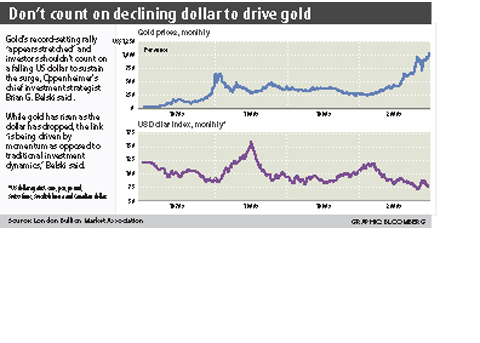Commodities mostly fell in volatile trading this week as investors tracked sharp swings in global equities and the US dollar amid news that the US has escaped from recession.
Official data showed on Thursday that the US economy emerged from a vicious recession in the third quarter, following France, Germany and Japan out of the worst downturn since the 1930s.
Many analysts said that the expansion was mainly the result of exceptional government measures to stimulate growth that would eventually expire.

At the same time, markets were rattled on Friday by data showing that US consumer spending, a critical growth driver, fell for the first time in five months in September.
OIL: World oil prices dived on Friday on profit-taking, mirroring losses on global stock markets, after surging the previous day on news that the US has bounced out of recession.
Earlier this week, oil had plunged as the dollar rose against rival currencies, and amid expectations of easing violence in Nigeria, whose crude production has been ravaged by militant attacks in recent years.
The announcement last weekend of an “indefinite ceasefire” by militants in Nigeria partly allayed investor concerns over potential supply disruptions in the African country. Nigeria is the world’s eighth-largest oil producer.
The oil market also fell on Wednesday as traders reacted to rising US crude and gasoline stockpiles and souring consumer confidence.
By Friday on the New York Mercantile Exchange (NYMEX), light sweet crude for delivery in December fell to US$78.11, from US$80.48 a week earlier.
On London’s InterContinental Exchange (ICE), Brent North Sea crude for December delivery dived to US$76.38, compared with US$78.91 a week earlier.
PRECIOUS METALS: Gold prices fell as the dollar rose in value, dragging other previous metals lower, analysts said.
The price of gold had hit an all-time high earlier this month at US$1,070.80 an ounce, before running into profit-taking.
By late on Friday on the London Bullion Market, gold fell to US$1,040 an ounce from US$1,061.75 a week earlier.
Silver slid to US$16.57 an ounce from US$17.65.
On the London Platinum and Palladium Market, platinum declined to US$1,320 an ounce at the late fixing on Friday from US$1,372.
Palladium retreated to US$324 an ounce from US$338.

WAITING GAME: The US has so far only offered a ‘best rate tariff,’ which officials assume is about 15 percent, the same as Japan, a person familiar with the matter said Taiwan and the US have completed “technical consultations” regarding tariffs and a finalized rate is expected to be released soon, Executive Yuan spokeswoman Michelle Lee (李慧芝) told a news conference yesterday, as a 90-day pause on US President Donald Trump’s “reciprocal” tariffs is set to expire today. The two countries have reached a “certain degree of consensus” on issues such as tariffs, nontariff trade barriers, trade facilitation, supply chain resilience and economic security, Lee said. They also discussed opportunities for cooperation, investment and procurement, she said. A joint statement is still being negotiated and would be released once the US government has made

NEW GEAR: On top of the new Tien Kung IV air defense missiles, the military is expected to place orders for a new combat vehicle next year for delivery in 2028 Mass production of Tien Kung IV (Sky Bow IV) missiles is expected to start next year, with plans to order 122 pods, the Ministry of National Defense’s (MND) latest list of regulated military material showed. The document said that the armed forces would obtain 46 pods of the air defense missiles next year and 76 pods the year after that. The Tien Kung IV is designed to intercept cruise missiles and ballistic missiles to an altitude of 70km, compared with the 60km maximum altitude achieved by the Missile Segment Enhancement variant of PAC-3 systems. A defense source said yesterday that the number of

Taiwanese exports to the US are to be subject to a 20 percent tariff starting on Thursday next week, according to an executive order signed by US President Donald Trump yesterday. The 20 percent levy was the same as the tariffs imposed on Vietnam, Sri Lanka and Bangladesh by Trump. It was higher than the tariffs imposed on Japan, South Korea and the EU (15 percent), as well as those on the Philippines (19 percent). A Taiwan official with knowledge of the matter said it is a "phased" tariff rate, and negotiations would continue. "Once negotiations conclude, Taiwan will obtain a better

FLOOD RECOVERY: “Post-Typhoon Danas reconstruction special act” is expected to be approved on Thursday, the premier said, adding the flood control in affected areas would be prioritized About 200cm of rainfall fell in parts of southern Taiwan from Monday last week to 9am yesterday, the Central Weather Administration (CWA) said. Kaohsiung’s Taoyuan District (桃源) saw total rainfall of 2,205mm, while Pingtung County’s Sandimen Township (三地門) had 2,060.5mm and Tainan’s Nanhua District (南化) 1,833mm, according to CWA data. Meanwhile, Alishan (阿里山) in Chiayi County saw 1,688mm of accumulated rain and Yunlin County’s Caoling (草嶺) had 1,025mm. The Pingtung County Government said that 831 local residents have been pre-emptively evacuated from mountainous areas. A total of 576 are staying with relatives in low-lying areas, while the other 255 are in shelters. CWA forecaster